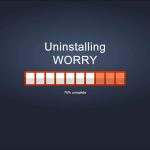As a young psychotherapist working in psychiatric programs at two major hospitals in the 1970’s, it seemed that many patients experiencing an emotional crisis were also identified as having “low self esteem.” This meant that they thought badly of themselves, compared themselves negatively with others, blamed and downed themselves, etc.
Naturally the treatment plans often suggested outpatient therapy, assuming that “low self esteem” would be addressed resulting in higher self esteem. Improved self esteem was associated with emotional well being and a successful outcome of psychotherapy.
Self Esteem Can Hurt You
It wasn’t until my post graduate training in REBT during the 1980’s that I came to understand how this revered metric of emotional health was actually flawed in meaning and practice. Esteeming—highly or lowly—one’s self is problematic, since the totality of our selves can not be known let alone accurately depicted by labels.
Think of the label “loser” applied to a human being. Can that possibly be accurate? Of course not. To be a loser one must have had to (from birth until now) failed, disappointed and screwed-up everything ever done, tried or even thought about. Not possible—just like being a winner doesn’t exist either. Our being is human. Self rating is self-deceiving and most often self-defeating.
10 Million Data Points
It has been estimated that for each 20 years of existence (thank you Tom Miller), humans evidence approximately 10 million distinctly different traits, characteristics and behaviors. So when a 30 year-old woman rates herself as “unlovable” she is ignoring most all of the 15 million things about her in order to perpetuate this delusion.
Self-esteeming is labeling, rating, ranking, comparing and judging our selves instead of, more accurately, our behaviors, traits and characteristics.
Labels belong on jars—not humans.
Love Yourself Silly
Self love is self-defeatingly similar to self esteem. It sounds so warm and fuzzy and just so important to do for yourself. That’s why many self esteemers flocked to Dr. Love (thank you Leo Buscaglia) in the 1980-90’s.
You can give yourself the tender and deserving gift of loving yourself—until you screw-up something pretty important. Then you can return to clobbering yourself with self downing. What a set-up for emotional instability and self dissatisfaction; going through life swinging from self loving to self loathing.
The Seesaw of Self Esteem
Many, if not most, humans feel poorly or not okay about themselves. They identify with having low self esteem in general as well as swinging from feeling real good about themselves at times to real bad about themselves oftentimes.
I refer to this emotional modulation as the seesaw of self esteem (and self love). Whether this silly seesaw swings up or down depends on the esteemer’s rigid belief in two irrational demands:
(1) I absolutely NEED the approval of others (and fear their disapproval), and
(2) I absolutely NEED to perform exceptionally well all the time for this defines who I am.
My Dire Need for Approval — Not!
Since I NEED and MUST have the love, liking, approval, support, and respect of just about everyone–and deem it awful if I don’t get it—I have to win their favor, say “yes” when I mean “no,” please and agree though it irks me, give praise when I’d rather puke, go along to get along, not rock the boat, do what others want and contribute to their happiness while sacrificing my own.
I rarely dispute my practiced irrational thinking (above) by reminding myself that I prefer, like, and want approval, but never do I need it.
My Success Defines My Worth — Not!
Since the adequacy of my actions, deeds and accomplishments determines my worth and adequacy as a person, I MUST always perform at my best and do perfectly well at everything.
I SHOULD feel badly and blame myself when I drop the ball or disappoint myself or others. If I act stupidly or poorly it will show that I AM stupid and unworthy and should feel awful about myself. I AM what I do, so if I fail at something I try to do, it will mean that I AM a failure. If I act disappointingly then I AM an asshole.
Unconditional Self Acceptance (USA)
What determines a human’s worth?
The answers are boundless and often arrive at intrinsic worth, which is to say that all humans have it, so whatever a human is worth, we are all worth the same. It would seem reasonable then to accept ourselves as being worthwhile by definition and leave it at that.
We are also highly imperfect, a fact that esteemers know intellectually until they screw-up or make a mistake and their seesaw comes crashing down from sainthood to shithood!
So let’s say that we humans are worthwhile by definition and very, disappointingly, fallible by nature. Let’s also simply remind ourselves that as much as we want approval we don’t need it like we do food, water, air, shelter and protection from physical harm. Preferential thinking preserves equanimity whereas rigid, demanding thinking ignites disturbed emotions.
And when we disappoint ourselves and others by our behavior we had better not damn and down ourselves as morons, idiots and assholes, but instead accept ourselves unconditionally.
What Does USA Sound Like?
Nobody ever taught me that wants don’t equal needs, desires don’t equal demands, preferences don’t equal musts and shoulds. And throughout my life when I found myself feeling angry or frustrated, anxious or depressed, those feelings didn’t come from the world outside—they came from my self-defeating thoughts inside.
I have been my own worst enemy, but now see that I can feel better by thinking better—about my Self, Others and the World.
By learning and applying REBT I can now be the architect of my own well being. I can accept myself as a worthwhile (like everyone else) but fallible human being (FHB), which is perhaps the only accurate label to ever put on myself. In this way I don’t have to build myself up or tear myself down. I don’t have to succumb to feeling great about myself at times or bad about myself at other times depending on being liked by others or successful at what I do. I won’t ream myself or esteem myself.
I will only rate and judge my efforts and behaviors for the purpose of DOING better—not BEING better. I will work daily at accepting myself unconditionally! USA-USA!
Radical Acceptance
Now imagine that you are proficient in REBT and have achieved a measure of USA, rarely ever blaming or damning yourself and realizing that you are not simply what you do. If an action is misguided or a remark ill-expressed, your worthwhile essence hasn’t suddenly flipped to bad or stupid. Though disappointed in your deed you remain, unconditionally, accepting of yourself.
Now what if you thought about others the same way you now do of yourself? You would be experiencing UOA—Unconditional Other Acceptance—and effectively managing anger/aggression.
And what if you thought similarly about the world? Bingo! ULA—Unconditional Life Acceptance—and effectively managing frustration and disappointment.
TAKEAWAY:
USA + UOA + ULA = RADICAL ACCEPTANCE





